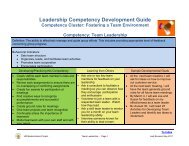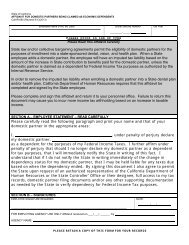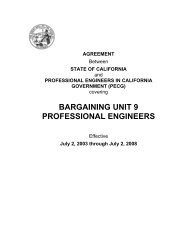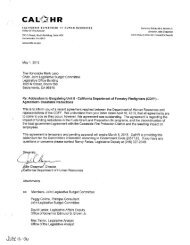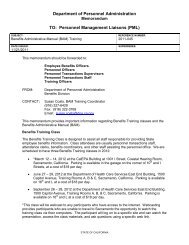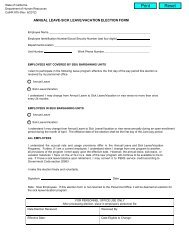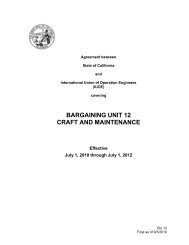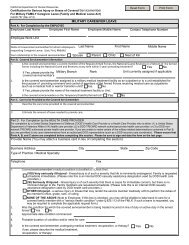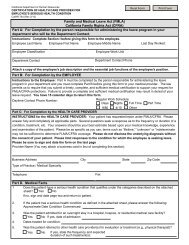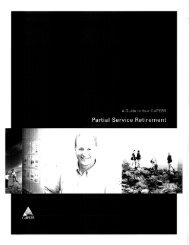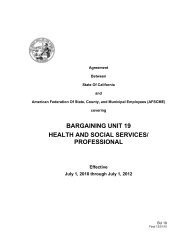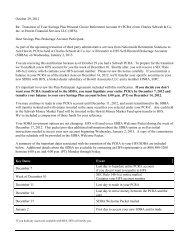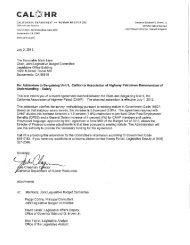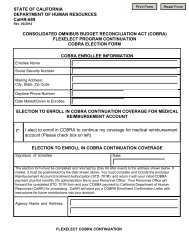Memorandum of Understanding with Unit 12 - Dpa - State of California
Memorandum of Understanding with Unit 12 - Dpa - State of California
Memorandum of Understanding with Unit 12 - Dpa - State of California
Create successful ePaper yourself
Turn your PDF publications into a flip-book with our unique Google optimized e-Paper software.
3. The differences between the employee’s net pay and the salary advance shall notbe reconciled until after the Department receives the Controller’s warrant for the payperiod.C. Those employees on voluntary payroll deduction who experience extended problemsreceiving payroll warrants may request that an explanation be provided to payroll deductioncreditor(s) by their departmental personnel <strong>of</strong>fice.D. This provision does not apply to those employees who are on non-industrial disabilityinsurance leave, industrial disability leave, or who are receiving worker’s compensationpayments.E. Upon specific request <strong>of</strong> IUOE, the <strong>State</strong> will meet <strong>with</strong> IUOE regarding specificdepartmental issues <strong>of</strong> timely issuance <strong>of</strong> overtime payments, shift differentials, premiumpay, or allowances.F. Upon request <strong>of</strong> the Union, any <strong>State</strong> agency shall meet <strong>with</strong> IUOE to evaluate itsdistribution <strong>of</strong> regular salary warrants. Any alternative method <strong>of</strong> distribution shall be inaccordance <strong>with</strong> <strong>State</strong> Administrative Manual sections 8580.1 and 8580.2. Any lawfulalternative method <strong>of</strong> salary distribution may be discussed <strong>with</strong> IUOE.2.8 Recovery <strong>of</strong> OverpaymentsFor purposes <strong>of</strong> overpayment, this agreement supersedes Government Code Section19838.A. Late Dock1. This section applies to employees on a negative pay system and only regular payissued through the negative pay process. It does not apply to permanentintermittent employees. It does not apply to any positive pay, such as, but notlimited to: overtime, shift differential, skill pay, etc.2. Whenever an employee is charged <strong>with</strong> late dock as defined by the <strong>State</strong>Controller’s Office (SCO) for the purpose <strong>of</strong> issuing salary through the negativepayroll system, the <strong>State</strong> will issue the employee’s paycheck for that pay period as ifno late dock occurred. This means that:a. the employee will receive a regular pay check on pay day.b. the employee will be overpaid, since the dock time will not have beendeducted from the pay check; andc. the employee’s pay will be adjusted for any dock time occurring before thecut <strong>of</strong>f date (late dock occurs on or after the cut <strong>of</strong>f date established bySCO).3. Employees who are overpaid because <strong>of</strong> operation <strong>of</strong> paragraph 2 above, willrepay the <strong>State</strong> for their overpayment by an automatic payroll deduction from the firstfeasible pay check following the late dock procedure as detailed in paragraph 2above. <strong>State</strong> agencies will make a good faith effort to notify each employee <strong>of</strong>overpayment and automatic payroll deduction via a standardized written notificationto be attached to the employee’s paycheck in which the overpayment occurs.Not<strong>with</strong>standing this provision, departments shall not be precluded from making theautomatic payroll deduction for repayment purposes if the required notification is notreceived at the time <strong>of</strong> the overpayment.10BU <strong>12</strong>(99-01)



